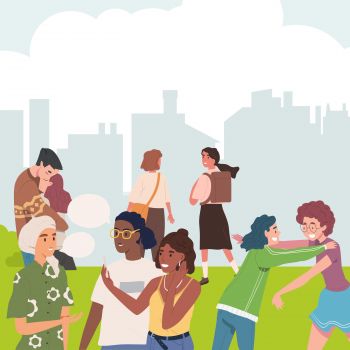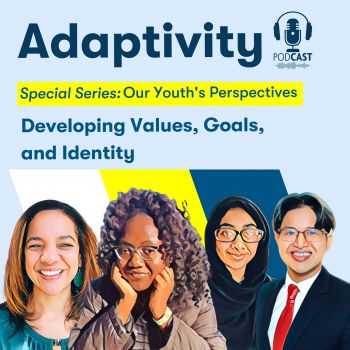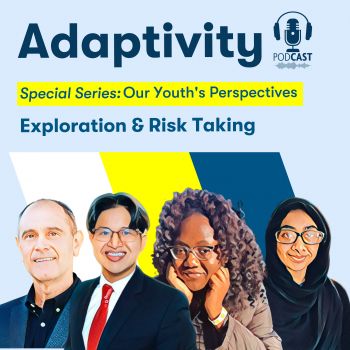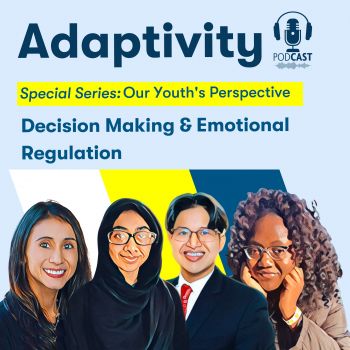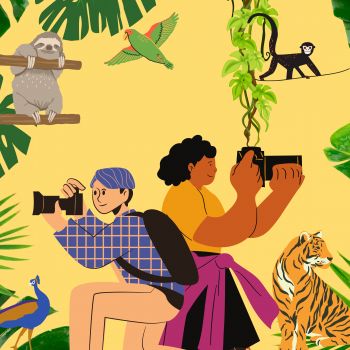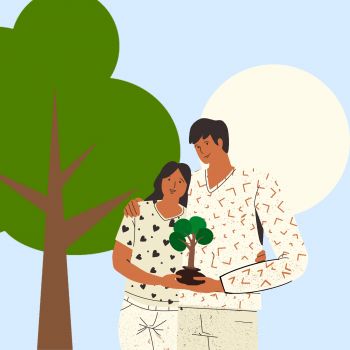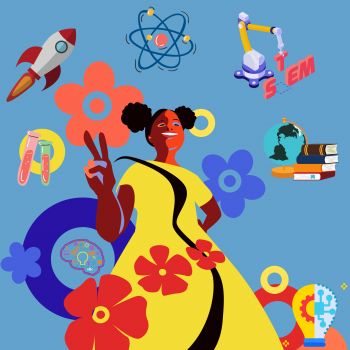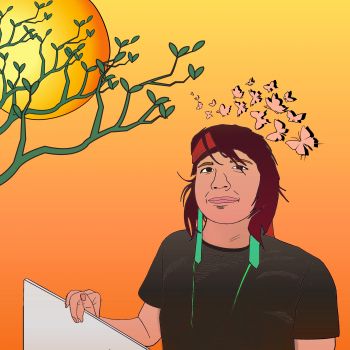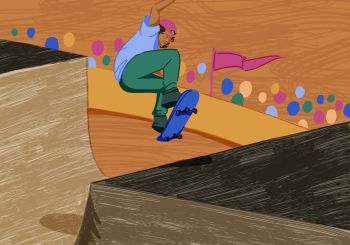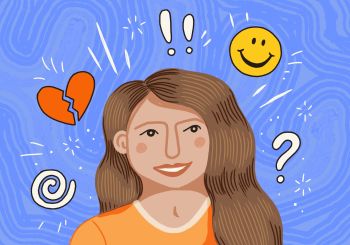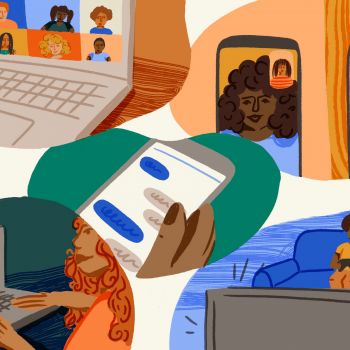Listen to this episode on iTunes, Spotify, or Libsyn.
Part 2 of this episode, featuring researchers Nick Allen and Jacqueline Nesi, is also out now.
*****
Ron Dahl Adolescents today are becoming increasingly savvy about social media.
Becker Chabaan It’s a necessary thing to learn, because at one point in everybody’s life you’re going to face social media, even if it’s not social media, just social interactions online, period. Everybody’s online and we’re not going to go back to pen and paper.
Ron Dahl And since technology is here to stay, how can developmental science help kids and parents learn to navigate this online world wisely?
Dallas Tanner My 13-year-old sister just got TikTok and I’m like, oh no, because there’s a lot of things on there that I may not feel she’s ready to be exposed to. But I think when it comes to, like, trial and error and trying to learn things, you also have to consider: are they responsible enough to be making these mistakes?
Ron Dahl The lure of new, exciting, risky environments has engaged teens throughout history. It is understandable why there is urgent concern about the dangers of kids on social media. Yet there is value in moving beyond overly simplistic reactions to explore the risks and opportunities from the perspectives of adolescents and the experts who study them.
*****
Ron Dahl I’m Ron Dahl, founding director of the Center for the Developing Adolescent, and this is Adaptivity, where we explore the science of adolescence, untangling misconceptions about the years between childhood and adulthood. We explore new insights into the rapid cognitive, emotional, and social changes that happen during these years. And how the developing adolescent brain is primed to promote healthy and adaptive learning.
Social media has become an almost universal part of modern American adolescence. Increasingly, technology is woven deeply into the fabric of how young people interact and connect in their moment-to-moment lives.
There are benefits to this digital connectedness. Social media can help young people find community with like-minded peers. It can provide access to new ideas and information, ways to be creative, to connect and contribute to the lives of others.
But there is also fear about social media’s negative effects on adolescents–and on their mental health in particular.
Research into the direct effects of technology use on young people is raising many questions. Most studies do not reveal large impacts on youth mental health. There is evidence that it can displace healthy behaviors like getting sufficient sleep. Also, young people struggling with emotional issues seem to be more vulnerable to problems online.
We also know that digital technology is not going away. Some are advocating for bans and barriers that can insulate young people from these dangers. However, there are three problems with this approach: First, it is enormously difficult to implement Second, it prevents access to many of the important benefits and opportunities. Third, it can undermine the development of fundamental skills and savvy to navigate a rapidly changing world—where technology is woven ever more deeply into the fabric of work, play, and daily life.
For our podcast, we’ve brought young people and researchers in to really dig into the nuance and complexity of digital tech. It’s a conversation that too often gets lost in the media headlines.
There is so much to unpack that we have broken this into two episodes. We begin by hearing this candid conversation I had with two college freshmen about social media and how they use it. I asked them to start by introducing themselves.
*****
Becker Chabaan Hi everybody. My name is Becker Chabaan. and I’m a freshman at UCSB.
Dallas Tanner Hi everybody. My name is Dallas Tanner. I’m 18 years old and I’m a freshman at UCLA.
Ron Dahl Great. Can each of you sketch out a little bit about your use of digital technology in your day-to-day communication and experiences?
Becker Chabaan Sure. The main apps I use would probably be Instagram and TikTok. Instagram mainly for communication. I do have a lot of friends that are somewhat international, so I use Instagram to communicate with them frequently. And TikTok, mainly for just entertainment.
Dallas Tanner I would say I mainly use TikTok, Instagram, and briefly use Snapchat. I use TikTok for entertainment-wise and sometimes to get information. Instagram is more for, like, just talking to my friends, putting an update on my life and Snapchat mainly just because of the filters.
Ron Dahl I now want to talk about not only our own experiences, but trying to think about younger adolescents. You know, young people 11 to 14—that early phase of becoming an adolescent, when social anxiety tends to be high even among extroverted people and we’re learning how to interact in more complex ways. And I’d love to hear each of you share some thoughts about how you think about both the advantages or opportunities for technology to facilitate some of that in early adolescence, and how it might create vulnerabilities or interfere with the kinds of social learning we hope young adolescents are doing at that phase of their life.
Becker Chabaan So I would say for me, something I had done was I was at a point in my life about two years ago where I wanted to start making new friends. And I think the benefit of social media and social platforms in general is that you can sort of speed up these relationships. It’s very easy to do so. And you can also have kind of quantity over quality. In a way. Let’s say, for example, you’re in period one of high school or middle school or whatever, and you see one person that you think you like, you have to wait a whole day to get that one period of, you know, 1 hour or 100 minutes or whatever, just to see that person again. With social media and texting anybody you want at any time, you can speed up the relationship. If both parties are interested in talking to each other, you could just talk to each other the whole day like nothing’s going to stop you. You can get really intimate with a person, not romantically, but friendship-wise, really quickly if you’re both interested in doing that.
Dallas Tanner So just to answer that question, focusing more on the, like, adolescent part, um, from the ages of 11 to 14. And I agree with you, Becker. It is very easy to speed up a friendship when you have social media, especially if you’re at school and you’re like, “Oh, I have the class with them, but like, I can’t talk to them until tomorrow, so I’m gonna I’m gonna text them. So it’s okay.” Right? It’s very easy to do that.
But looking at it from an adolescent point of view, specifically talking about the ages of 11 to 14, that can also be, in my opinion, a very dangerous thing to use social media to connect with different people, because there have been times where, like, with the messages you have sent have been exposed, and maybe it was something you didn’t want anybody to know, or maybe it was something that you weren’t comfortable sharing with everybody else. That’s why social media is a great platform to meet different people. They have tons of apps where you can meet different ways, go into different chats for different communities, say, “Oh, I’m a music lover.” So there’s like things where you can go and meet other people who have your similar interests.
However, thinking about it from like 11 or 14, that is a dangerous place to be in because social media is not just for adolescents, it’s for everybody. And that brings a level of danger because you never know, like, what somebody is planning or if somebody is using it in a way that could be harmful, not only like mentally or emotionally, but also physically.
Ron Dahl You’re both making such great points. Let me introduce another level to this. Thinking about some of the science that informs as part of our center that’s informing opportunities to promote healthy development. One of the things that we know is that so much of the social learning across adolescence, but particularly in early adolescence, is, in essence, trial-and-error learning. And you have to make some mistakes and learn from them. That’s just fundamentally how it works. Social interactions and the emotional responses are complicated, and everybody’s going to make mistakes, and hopefully that’s a part of the healthy learning.
But as you were pointing out, Dallas, those mistakes can have different consequences and stakes when social media and technology is involved and the kinds of mistakes that help us adjust our behavior and learn from them that are healthy and the kinds that can be costly, is a whole other realm of these considerations, as you’re talking about, and I’d love to hear more of your thoughts and examples from your own lives, or the things that you’ve seen of what kinds of things might promote the healthy learning of young people experimenting with who they are and who they like, and when to take risks about revealing things and developing trust, and how to learn that. There’s also a need to be careful and be wise about how and when to do that.
Dallas Tanner I think a big thing when it comes to, like, taking risks and learning from mistakes. I am a firm believer in that. I have a sibling in that age range that’s getting to the point where she’s using social media. Like, my 13-year-old sister just got TikTok and I’m like, oh no, because there’s a lot of things on there that I may not feel she’s ready to be exposed to. But I think when it comes to, like, trial and error and trying to learn things, you also have to consider, are they responsible enough to be making these mistakes? Because everybody makes mistakes. It’s natural. It happens. It’s nothing to be ashamed of, but there are just some things that you shouldn’t be trying out at certain ages. And I think that’s something that really needs to be taken into consideration.
So, like, as far as social media, I’m a firm believer that you don’t need social media until like maybe 13. Even that’s even young for me. And I’m only saying that because I don’t want to be a hypocrite because I had social media at 13, right? However, I’m saying that now because if you look at maybe like the youth nowadays, they’re like iPad kids who are kids who like, don’t really interact socially outside or they don’t play outside like I used to, or my mom and older generations used to. And then you have people who have such bad social anxiety they can barely say hello to another classmate because all they’re used to is being on technology. So I think when it comes to trial and error on social media, that’s a great thing. And it does take time and it is hard. But before you can do that, you have to be able to communicate to somebody in person.
Ron Dahl Becker?
Becker Chabaan I just want to add one thing really quickly, and it’s the fact that everybody should be aware that they are in control of their social media. Period. If you don’t like somebody, you do not owe that person anything. And you do not have to keep talking to them. Do not be afraid to block, ghost, whatever. It’s totally up to you. And I think that’s what a lot of 11- to 14-year-olds forget. It’s that they have the control to leave the situation if they see it’s going south. I think a lot of them think that if you get social media in a school environment where there’s sort of peer pressure to live up to standards–like, if they stop talking to this person and they know them at school, what kind of gossip is that going to create? And even with that being just the way the schools work nowadays, it still doesn’t change the fact that you are in control. And if you feel that it’s hurting you in some way, just exit the situation.
Ron Dahl Again, really great points. Let me bring in another frame to these issues that we’re talking about, especially for the younger adolescents. And that is the effort to regulate this. And as I know you’re all aware, there’s been a lot of activity at multiple levels at the federal level, at state level, different countries to regulate access to and use of technology and to hold technology companies more responsible for creating protection. And given what we’ve been saying about both the opportunities and risks, I’d love to hear your thoughts about what kinds of regulation might be helpful and what kinds of regulation might be inadvertently not helpful, or actually interfere with the kinds of exploration and learning and positive aspects of using technology that can be possible despite the risks.
Dallas Tanner Becker, would you like to start?
Becker Chabaan Okay, sure. What comes to mind when I hear government regulation of social media? I think, and a lot of people would probably think this, is the TikTok ban that was going through Congress a few months back. And I think when you try to regulate something that is explicitly for personalization and characterization of people, I think that’s where the government kind of loses its fan base in a way. I think it’s just a disadvantage in general that social media has somewhat become a place for politics, although obviously I’m all for politics being shared on social media. But I think when it becomes strictly about that or it becomes social media outlets that are strictly for politics, I think that’s when governments feel the need to get involved, and then that’s where it’s disadvantaged to have social media in a way.
Dallas Tanner So, as far as, like, regulations, when it comes to social media, I’m gonna also talk about the TikTok ban, because I think that’s a great example of it. I think it’s very hard to regulate things like social media because especially in America, we do have our rights like freedom of speech, First Amendment rights. And that is a big thing when it comes to the TikTok ban is like you’re trying to limit what we are able to share, what we’re able to talk about, and that is where I feel it becomes very political, because you have the government saying, well, no, you can’t do this, this, this, and this. But then with our Constitution, it’s like, well, we have freedom of speech.
And I think something that really needs to be clarified is having the freedom of speech does not mean you don’t have any consequences. Now, you can say something and you can post something, but there will be consequences to that. And I think that’s something that I think TikTok does really well and it could actually improve in, is regulating what’s being posted and what’s being said. Now, I’m not against anybody posting whatever they want to post, however they are. I’ve seen some things on TikTok that should not have been on there at all. Promoting very dangerous things, very inappropriate things that should not be used on there. And when it comes to regulating it, they do have systems that go in and check these videos and will delete the videos and will delete an account or ban somebody from using the app. And I feel like that’s a very good way to regulate them. But also there should be age limits on when you can use certain apps, especially now because of where we are in our country right now, what’s being said and what’s being talked about and the dangerous things that are happening in the world. There should be an age limit because not every child needs to know about the horrors out in the world. You want to keep a level of innocence, and regulating social media is a great way to do that. Yeah.
Ron Dahl So one of the things I would like to have us think about a little bit in this regulation space is how you were talking. Each of you were talking earlier about the learning process. And so Dallas, your 13-year-old sister benefits from having you as an older sister to scaffold her learning and help give her guidance from a trusted person to have her trial-and-error learning be positive. And, Becker, you know, you were talking about there’s some things that if you could convey to someone that age about their ability to end or get out of a conversation when they need to.
But of course, there are lots of young people who don’t have people like you in their lives to help scaffold their learning and healthy learning, which raises the issue of how to protect those young people who may not have as many advantages and supports to have the learning be supported. That raises some really difficult issues. How to build in those protections for the most vulnerable young people, but not interfere with the ability for other young people who may be learning from those experiences. I’d love to hear your thoughts, thinking about the range of young people who are out there exploring without much support, or maybe other family members or caring adults that are monitoring and helping them learn from their mistakes.
Becker Chabaan Um, I think the first thing I would do would be to improve social media literacy in schools and make it part of their education. I also have two younger brothers. One is 15, one is 13, and my 15-year-old brother has social media already. But I advise my 13-year-old brother to not because I said hold on, there’s no necessity for this yet in my opinion. But yeah, I’m the only one saying that to him. So I was saying improve social media literacy in schools. And I’ve had in my school social media literacy classes that kind of, not much, teach the dangers of social media, but teach more so the benefits of social media. And I think both are equal.
So I say make it like a health class, like it’s a necessary thing to learn, because at one point in everybody’s life you’re going to face social media, even if it’s not social media, just social interactions online, period. Everybody’s online and we’re not going to go back to pen and paper.
Ron Dahl Really good points. Dallas?
Dallas Tanner I think that when it comes to, like, people who don’t have maybe an older sibling or maybe their parents have, like, an older generation, so they’re not as familiar with social media. What it really comes down to is us as a community. It’s honestly like the older generations and like maybe the older ones of Gen Z or like my generations to be the leading hand for in our community so that like our siblings, our sisters, our brothers, our friends, the younger ones of us who are just now finding out about social media or just exploring this new world can do it in a safe way. Honestly, it’s not realistic to have somebody sitting down watching everything 24-over-seven. But with AI you can build like different bots or different codes to make sure that what’s being shown is safe.
But then I think that’s also a great thing about some social media platforms that already have that. For example, YouTube, you have kids who want to watch YouTube videos and want to watch YouTube channels. There’s YouTube Kids, which not only has educational stuff, but also limits what you can see on there for your age. My 7-year-old sister, she has YouTube Kids. My 3-year-old brother, he’s on Cocomelon constantly, right? But it’s all limited because of the settings or the bots or the regulations that these social media apps have in place. And while it’s important that we don’t infringe on anybody’s rights to post whatever they want, I think it is important for us as a community to really step up and make sure that our children are safe, because eventually they’re going to be the ones making the decisions. They’re going to be our lawmakers, our presidents, our doctors, and you want to make sure that they have the best time developing or the best life growing up so they can be safe.
Ron Dahl Really good points. Let me just summarize two aspects of what I heard each of you say. One is, Becker, when you were talking about literacy and programs to promote that like a health class, I think it’s important to recognize that it’s not just helping young people have the knowledge of how to deal with these risks, but the skills. And just like with driving skills or bicycle skills, in order to develop not only knowledge but skills, you need practice. It’s not just giving them the information, it’s really helping them develop the skills. And so Dallas, you’re describing like if they don’t have some ability to actually try this, then it’s hard to develop some of those skills. But you also were talking about how the technology companies and platforms can do a better job of setting them up in ways that are more likely to promote more positive learning experiences and less likely to encounter the harmful ones. And I think those are really important issues.
Given the principles that are coming up around this, what do you think about the policy pushes now to ban cell phones in schools?
Dallas Tanner Okay, I’m kind of biased in a sense.
Ron Dahl That’s what we want to hear.
Dallas Tanner But I’m a little biased, right? I don’t think you should totally ban phones in school because phones are like the internet in our pockets. Like if you really sit there and think about it, like my uncle tells me all the time, he’s like, wow, we really have access to the entire world in like, our back pockets. And I think that’s a great resource to have because our phones, if used correctly, they can be quite helpful in our learning.
However, for being realistic, they’re not, especially at school. They’re quite distracting at times. And I say that as somebody who has been caught using their phone while they should have been paying attention, so maybe not ban them completely. I know some schools use like, this magnetic pouch and you put your phone in it. You can’t open it, and I think that’s a good thing to do. I don’t think it should be banned all day. Maybe give the students access to them during things like I don’t want to say recess. It’s very elementary, but, like, maybe nutrition or lunch. So they do have, like, a space to unwind because honestly, that’s what nutrition and lunch is for. So you’re not sitting there staring at books the entire day and then maybe, like, enforce stricter rules when it comes to having your phone out in class, because most times they’ll just take your phone and you’re like, okay, well, I’m gonna get it back. Or maybe they have, oh, if I catch you with your phone out three times, it’s detention and then you can’t do this or something like that. I think they shouldn’t be banned. Maybe just enforce the rules. So it’s stricter.
Becker Chabaan Similar to Dallas. I agree that it should definitely not be banned. There’s no need to ban something that a lot of people find enjoyment in, especially during school. For me, when I was in high school, I, at nutrition and lunch, I would go on my phone, watch TikTok, you know, text friends. That’s what I would use my nutrition and lunch for. Now, did I have some classes that allowed phones during class? Yes. Did I take advantage of that? Yes. But I also understand that if the phones are not used for malicious purposes, such as ChatGPT looking up answers during a quiz or doing whatever. Yeah, I totally agree that phones in that time should definitely not be anywhere near you whatsoever. But if it’s like a class, like I had filmmaking class, and if the teacher had said, okay, I want you all to film a ten second video on your phone, then phones are a great use to be in school. You know, it shouldn’t be banned statewide when so many things require phones. But yeah, I didn’t have a phone until I was in my first year of high school. All through middle school I did not have a phone, so I stayed at all the middle school drama completely. I don’t see a need for phone use in middle school. I see a need in high school. That’s just what I want to say.
Ron Dahl Yeah, Dallas.
Dallas Tanner I just want to say one more thing. I think phones also are great to have, especially for students for safety reasons too. It is sad, but we do have like a little bit of a gun control problem and the school shooting problem in this country. Like that’s a very grim topic, but it’s something that needs to be considered when we want to ban phones, because God forbid anywhere has a school shooting. Having our phones is very important for us to like, say goodbye to our parents, if sadly that happens, or just being like, “Please call 911, help!” Like, I just think it’s a great resource because what if the teacher can’t get to the phone fast enough? Then we all have access to be like, “send help, send help, send help.” So I think it’s also, like, a safety reason of why we shouldn’t have our phones completely taken away at school.
Ron Dahl Yeah, it is a mode of connection that can be powerful in so many ways and extenuating circumstances for safety. For reaching out, for communicating. And those capacities are important to keep in mind.
I want to shift to add another layer to this of what it’s like to just stop using technology for a period of time. You know, take a break, like whether it’s a day, a week. And what’s interesting is how many people who have experimented or just happen to be in situations where that happened recognize different things, that being immersed only in real life interactions for a longer period of time sometimes makes them aware that they’re seeing or experiencing things a little differently than they have been in their day-to-day lives. And I’d love to hear from each of you, whether you’ve had any experiences like that, or even if you do the thought experiment, what kinds of things that makes you think about that? Even if there’s all these advantages and they’re helping in all these ways, could there be some advantages of stepping back and having that contrast experience? And what’s different about that?
Becker Chabaan I want to speak on that first, because I had done basically that in around March or April of 2022. I decided to do a full month without my phone, period. Like the only thing I used it for was to text my parents or call my parents and use it for school to like, research and get information and whatnot. But other than that, I didn’t even text people. I said, if you want to talk to me, talk to me in person. That’s like, yeah, like I was talking about those international friends of mine. I said bye to them for a month, and there was not a specific reason for this other than I wanted to see what it’s like.
And so I said, one day, not one day, I had one night. I said, okay, tomorrow I’m not going to use my phone for a month, and then boom! The next morning I deleted everything–TikTok, Instagram, everything. I basically didn’t use my phone, and the first change I saw from that was that I was getting a good amount more of sleep, because what I would do is I would get home, get on my phone, use it for about an hour, hour and a half, eat in between and whatnot, and then go do my work. And then whatever time I had past schoolwork or studying or whatever, I would go on my phone. I would use my phone and going on my phone as a reward system for completing my work. And so if I had felt that I completed my work at a late time, I would push my bedtime past it just to go on my phone because I felt, “Okay. I did my work. It’s time for the phone,” you know?
And so I would go to bed, I don’t want to out myself, but I would go to bed at late times and let’s just say I was getting six hours or less of sleep on certain days. So basically when I stopped using my phone immediately, like when I finished my work, I was like, what am I going to do? There’s nothing else to do but sleep. So I went to sleep, so I got more sleep. I’m fairly certain my grades improved, because I also had more time to focus on what I was learning, instead of kind of having it in the back of my head. Okay, I just finished this and you can go on your phone, you know? So it benefited me a lot in that respect for the entire month. And that’s the first time I think I realized that sleep actually does have a big effect on how you perform, not only in school, but just like in life.
Ron Dahl That was a wonderful description. Thank you.
Dallas Tanner So I’m the complete opposite. I did it one time in middle school because I was forced to, like, we went on a trip to, um, I think it’s Big Bear. And they were like, we really want you to be immersed. So they took our phones and I was like, please give it back, I miss it.
And while I did find myself like doing more things, I did talk to my friends a lot more and we went outside. I’m not a nature person at all, but not having my phone convinced me to go on a hike and it was a beautiful hike. Never wanted to do it again. Um, I don’t know. I missed my phone. I think just because sometimes I’m the type of person who likes to capture memories, and I didn’t have a camera at the time. So every time I was like, oh my God, that’s really pretty. I really want to, I want to show my friend, I want to send it to my friend. I would go to look for my phone and then it wasn’t there. And I went a little stir crazy. So I don’t know, that’s just me personally.
I can go without my phone now, right? Like when I’m hanging out with friends, we all have a rule where, like, we put our phones in our pockets, we’re there to spend time with each other. We only check it if it’s like, oh, checking the time. Or one of our parents texted us. But personally, I like to have my phone on me. I don’t need it, but I prefer it, if you know what I mean.
Ron Dahl Yeah. So this is fascinating. Let me just shine a light on a couple of things that I heard. One is Becker, in your situation, you decided to do this. It was voluntary and you were interested in what it might do. And, you know, Dallas, it was imposed on you. It was like you were like, whoa, wait a minute. Like you’re taking my phone away when I want to be using it in these ways. And so I think that has some really important implications for all the science that we know about adolescence is autonomy. Making our own decisions and having agency is so important. Dallas, even your description of how among your friends, you might all agree that if you’re at a meal or in some situation, you’re going to put your phones down. So it’s sort of like the literacy and the developing skills and knowledge helping young people learn to set their own boundaries about phone use, about discovering the advantages of putting it aside and noticing different things might be a better strategy than just making regulations and taking these opportunities away from young people. I’d love to hear your thoughts about that, and especially for the younger adolescents.
Dallas Tanner So I have a lot of siblings. I’m the eldest one. So when it comes to like, technology, especially, like, our phones and stuff, for me the best thing I would say is the younger they are, you should set rules for them.
So I know some parents, they have like screen time where you only get like an hour of screen time a day or two hours, anything like that. And I feel like as the older you get, you shouldn’t try to control it completely because it’s human nature. If you take it away from us, we’re going to find a different way to get it, right. I think it’s very important, as you said, to like, help adolescents really try to figure out what works for them, what’s the best amount of screen time they could be using that helps improve their grades? You know, so I think it’s very important that especially when you’re trying to help adolescents, you have to be able to communicate with them. When you have people in middle school or like you’re turning 14 or 15 or you’re going into high school and you’re just like, no, I’m going to take your phone at a certain times, I feel like that goes against what you’re trying to accomplish. It’s very important. You need to communicate, and you need to explain why you’re doing this and not try to control it completely and take the option away. Because once you take the option away, it builds resentment. It builds–okay, I’m going to become sneaky because I will say this for a fact. You could take my word for it that if the stricter you are, the sneakier your kids in adolescence will become.
Ron Dahl Good point.
Becker Chabaan I want to just add one thing to that. Thinking about it now with how I know myself. If I had told my parents, take my phone from me and don’t let me have it, I think I would have a completely different outlook on how the whole month went for me. Because intention is everything when you’re trying to control yourself. If you don’t intend to stop yourself from doing something, it’s not going to help you. In the end, it’s only going to make you want that thing more. And that’s exactly what Dallas was saying with the sneakiness. I think I would be the kind of person that would start negotiating and pleading with my mom or my dad to say, okay, one hour. I mean, come on, you know, you got to let me have it. You can’t stop me. But the fact that it was in my pocket throughout the entire month, and I still had the ability to use social media, I could download it at any time during that one month. But I chose myself not to do it. And that’s the whole point of it. It’s the intention. It’s that you wanted to stop yourself and nothing was stopping you.
Ron Dahl Thank you. I want to just end by giving each of you a chance to reflect on something from this conversation that intrigues you, or that you’re thinking about in this space. I’d love to hear any final thoughts that we haven’t covered or observations.
Becker Chabaan I’m going to personally think about that whole regulation system of social media past this podcast. I’m going to be thinking like what really can be done to fix social media if it can be fixed, or is it just this force in our lives now that’s going to be there forever and cannot be changed.
Dallas Tanner I agree with Becker. I think the regulation system is what I, with this podcast and in thinking outside of it, is what I’ve been thinking a lot about and just thinking about the pros and cons of social media. Because in my opinion, social media is a beautiful thing and it has the potential to lead to even more beautiful things, but it also has the potential to be disastrous and affects tons of people like culturally or just emotionally, physically.
Ron Dahl Well, thank you both so much. I cannot imagine having had a better conversation.
Dallas Tanner I just want to say thank you. Thank you so much for having us and giving us the space to talk about things like this. I think it’s very important to have youth voices out there advocating for things like this, warning about the pros and the cons just because when you only have adults talking about it, maybe the youth are like, well, you don’t really know. So just thank you for giving me and Becker this opportunity to talk.
Becker Chabaan Yeah. The whole experience has been great. Thank you all.
*****
Ron Dahl Thanks so much to Dallas Tanner and Becker Chabaan for sharing their wisdom and insights with us today.
If you’d like to learn more about the science of adolescence, visit us at adaptivitypodcast.org or share your thoughts through the contact information at our website or by using the hashtag: adaptivitypod.
Our podcast is produced at UC Berkeley for the UCLA Center for the Developing Adolescent. Our senior producer is Polly Stryker. Our producer is Meghan Lynch Forder. Our engineer is Rob Speight. I’m Ron Dahl. Thank you for listening.

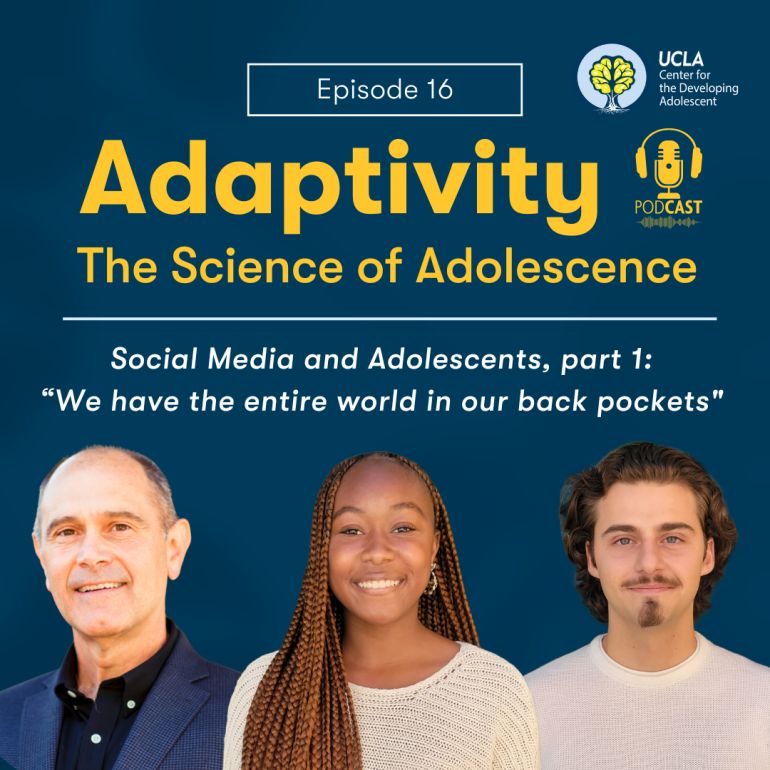
_350_350_80_c1.jpg)
_350_350_80_c1.jpg)
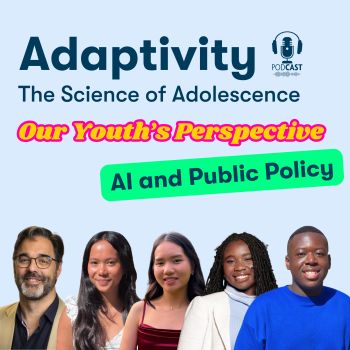
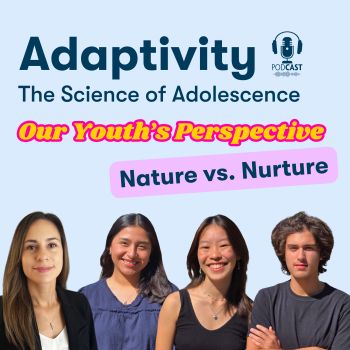
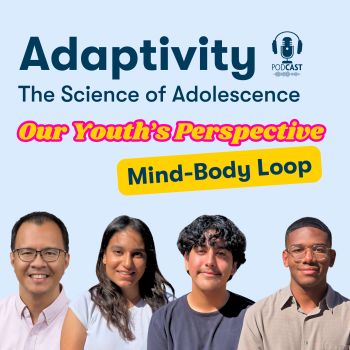
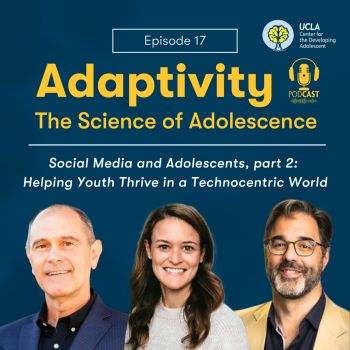
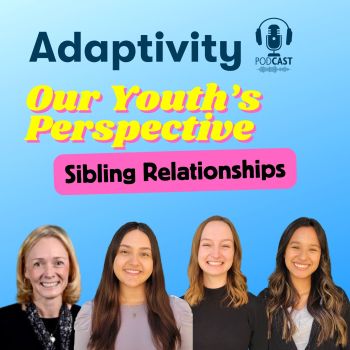
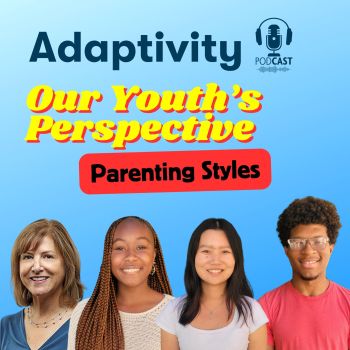
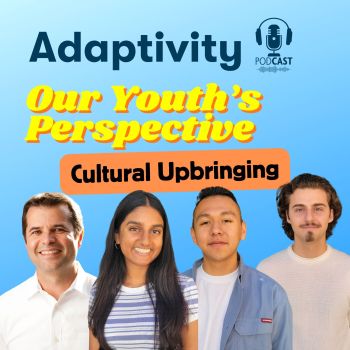
_350_350_80_c1.jpg)
